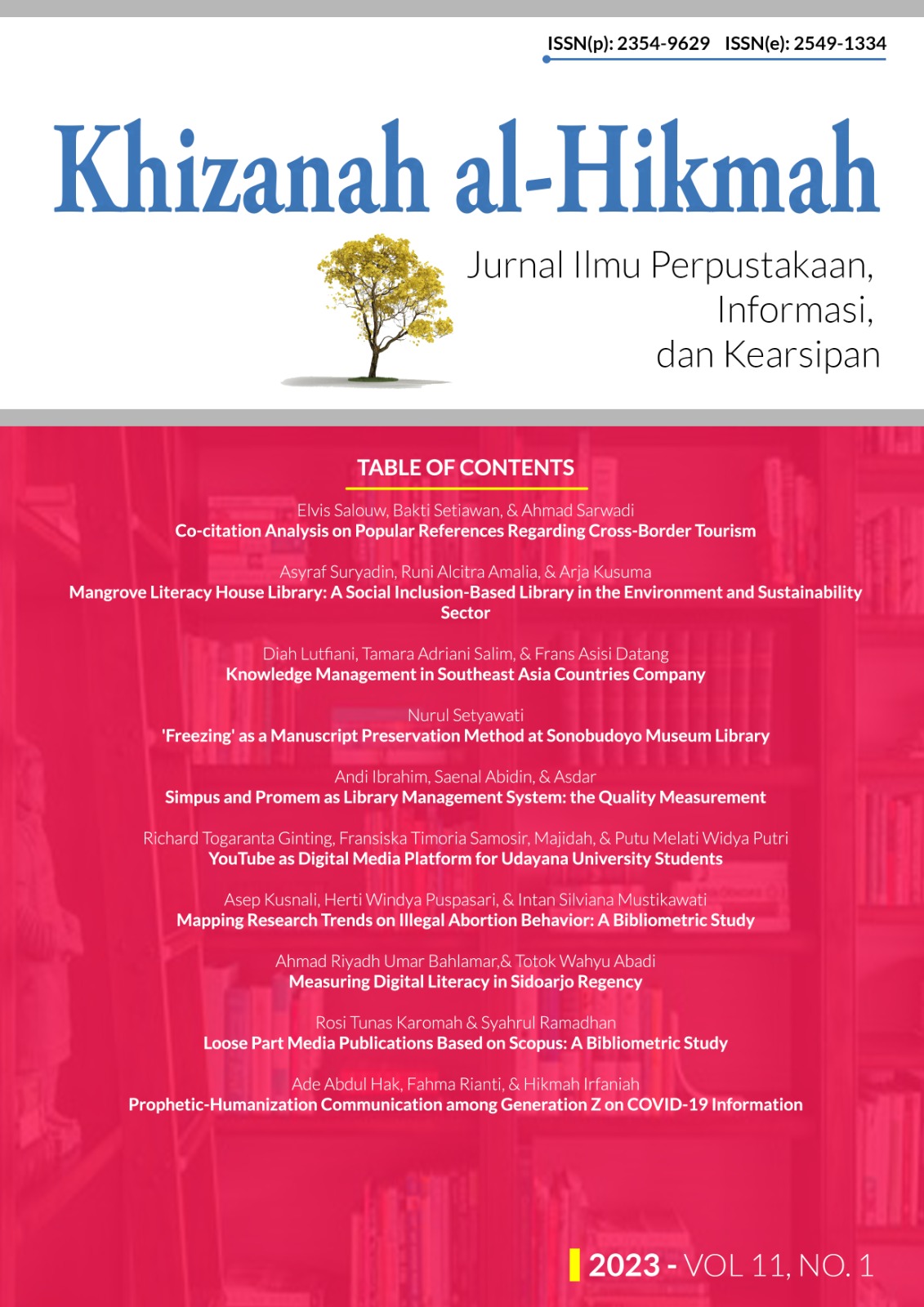Co-citation Analysis on Popular References Regarding Cross-Border Tourism
Abstract
Cross-border tourism (CBT) is a new discourse that attracts the attention of researchers from various scientific fields. Along with the development of CBT research, it is necessary to map and trace references related to CBT so that it becomes a reference in research. To that end, using bibliometric analysis by analyzing 334 articles, the study aimed to answer the question; Who is the most influential author in the CBT study? What are the most cited references in studies on CBT? In the Scopus database, what are the most cited journals? Specifically, the study used co-citation analysis to map important references, as well as journals that have a broad influence on CBT topics. Data visualization in this study used VOSViewers as well as content analysis of several related documents. The results of the study showed that the most widely used reference in publications related to CBT is D. J. Timothy's book. The study also emphasizes that Timothy is the most popular author in the discourse on CBT. In addition, in CBT publications, the most influential journal is Tourism Management. This study has implications for researchers who want to conduct studies on CBT in determining references and determining destination journals.
Downloads
References
Blasco, D., Guia, J., & Prats, L. (2014). Emergence of governance in cross-border destinations. Annals of Tourism Research, 49, 159–173. https://doi.org/10.1016/j.annals.2014.09.002
Fink, A. (2014). Conducting Research Literature Reviews: From the Internet to Paper. In New Horizons in Adult Education and Human Resource Development (Vol. 20, Issue 4). SAGE Publications. https://doi.org/10.1002/nha3.10270
Harzing, A. W., & Alakangas, S. (2016). Google Scholar, Scopus and the Web of Science: a longitudinal and cross-disciplinary comparison. Scientometrics, 106(2), 787–804. https://doi.org/10.1007/s11192-015-1798-9
José de Oliveira, O., Francisco da Silva, F., Juliani, F., César Ferreira Motta Barbosa, L., & Vieira Nunhes, T. (2019). Bibliometric Method for Mapping the State-of-the-Art and Identifying Research Gaps and Trends in Literature: An Essential Instrument to Support the Development of Scientific Projects. Scientometrics Recent Advances, November, 1–20. https://doi.org/10.5772/intechopen.85856
Keathley-Herring, H., van Aken, E., Gonzalez-Aleu, F., Deschamps, F., Letens, G., & Orlandini, P. C. (2016). Assessing the maturity of a research area: bibliometric review and proposed framework. Scientometrics, 109(2), 927–951. https://doi.org/10.1007/s11192-016-2096-x
Liao, H., Tang, M., Luo, L., Li, C., Chiclana, F., & Zeng, X. J. (2018). A bibliometric analysis and visualization of medical big data research. Sustainability (Switzerland), 10(1), 1–18. https://doi.org/10.3390/su10010166
Martín-Martín, A., Orduna-Malea, E., Thelwall, M., & Delgado López-Cózar, E. (2018). Google Scholar, Web of Science, and Scopus: A systematic comparison of citations in 252 subject categories. Journal of Informetrics, 12(4), 1160–1177. https://doi.org/10.1016/j.joi.2018.09.002
Muta’ali, L., Marwasta, D., & Christanto, J. (2018). Pengelolaan Wilayah Perbatasan NKRI. UGM Press.
Okumus, B., Mehraliyev, F., Ma, F., & Köseoglu, M. A. (2021). Intellectual connections in food tourism literature: A co-citation approach. International Journal of Tourism Research, 23(2), 220–237. https://doi.org/10.1002/jtr.2409
Pathmanandakumar, V., Chenoli, S. N., & Goh, H. C. (2021). Linkages between climate change and coastal tourism: A bibliometric analysis. Sustainability (Switzerland), 13(19), 1–21. https://doi.org/10.3390/su131910830
Polat, E., & Koseoglu, M. A. (2022). Wellness tourism scholarship: a research agenda. Journal of Hospitality and Tourism Insights. https://doi.org/10.1108/JHTI-05-2022-0186
Salouw, E., Aji, K. B., & Tahalea, S. P. (2023). Cross-Border Tourism: What We Can Learn So Far from Eminent Scientific Publications Using Bibliometric Analysis. International Journal of Sustainable Development and Planning, 18(2), 457–464. https://doi.org/10.18280/ijsdp.180214
Small, H. (1973). Co-citation in the Scientific Literature : A New Measure of the Relationship Between Two Documents. Journal of the American Society for Information Science, 24(4), 265–269. http://onlinelibrary.wiley.com/doi/10.1002/asi.4630240406/abstract%5CnD:%5CZotero_Data%5CZotero%5CProfiles%5C1sqw9v0j.default%5Czotero%5Cstorage%5CGCR7NPQA%5Cabstract.html
Stoffelen, A., Ioannides, D., & Vanneste, D. (2017). Obstacles to achieving cross-border tourism governance: A multi-scalar approach focusing on the German-Czech borderlands. Annals of Tourism Research, 64, 126–138. https://doi.org/10.1016/j.annals.2017.03.003
Stoffelen, A., & Vanneste, D. (2017). Tourism and cross-border regional development: insights in European contexts. European Planning Studies, 25(6), 1013–1033. https://doi.org/10.1080/09654313.2017.1291585
Timothy, D. J. (1995). Political boundaries and tourism: borders as tourist attractions. Tourism Management, 16(7), 525–532. https://doi.org/10.1016/0261-5177(95)00070-5
Timothy, D. J. (2001). Tourism and Political Boundaries. Taylor & Francis.
van Eck, N. J., & Waltman, L. (2010). Software survey: VOSviewer, a computer program for bibliometric mapping. Scientometrics, 84(2), 523–538. https://doi.org/10.1007/s11192-009-0146-3
Weidenfeld, A. (2013). Tourism and cross border regional innovation systems. Annals of Tourism Research, 42, 191–213. https://doi.org/10.1016/j.annals.2013.01.003
Wong, A. K. F., Köseoglu, M. A., & Kim, S. (Sam). (2021). The intellectual structure of corporate social responsibility research in tourism and hospitality: A citation/co-citation analysis. Journal of Hospitality and Tourism Management, 49, 270–284. https://doi.org/10.1016/j.jhtm.2021.09.015
Copyright (c) 2023 Elvis Salouw, Bakti Setiawan, Ahmad Sarwadi

This work is licensed under a Creative Commons Attribution-NonCommercial-ShareAlike 4.0 International License.
By submitting your manuscript to our journal, you are following Copyright and License

